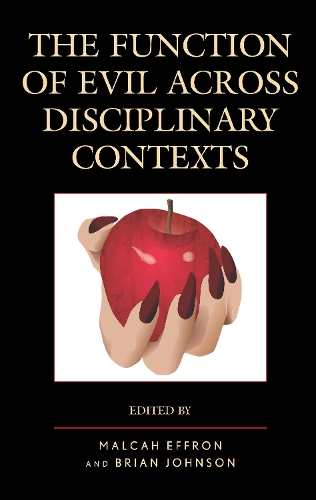
The Function of Evil across Disciplinary Contexts
(Hardback)
Available Formats
Publishing Details
The Function of Evil across Disciplinary Contexts
By (Author) Malcah Effron
Edited by Brian Johnson
Contributions by Riven Barton
Contributions by Jim Casey
Contributions by Chu-chueh Cheng
Contributions by Olivia Coulomb
Contributions by Marion Duval
Contributions by Jessica Folio
Contributions by Charity Fowler
Contributions by Jamey Hecht
Bloomsbury Publishing PLC
Lexington Books
15th February 2017
United States
Classifications
Professional and Scholarly
Non Fiction
Popular culture
170
Physical Properties
Hardback
244
Width 160mm, Height 237mm, Spine 21mm
476g
Description
The Function of Evil Across Disciplinary Contexts explores answers to two important questions about the age-old theme of evil: is there any use in using the concept of evil in cultural, psychological, or other secular evaluations of the world and its productions Most importantly, if there is, what might these functions be By looking across several disciplines and analyzing evil as it is referenced across a broad spectrum of phenomena, this work demonstrates the varying ways that we interact with the ethical dilemma as academics, as citizens, and as people. The work draws from authors in different fieldsincluding history, literary and film studies, philosophy, and psychologyand from around the world to provide an analysis of evil in such topics as deeply canonical as Beowulf and Shakespeare to subjects as culturally resonant as Stephen King, Captain America, or the War on Terror. By bringing together this otherwise disparate collection of scholarship, this collection reveals that discussions of evil across disciplines have always been questions of how cultures represent that which they find socially abhorrent. This work thus opens the conversation about evil outside of field-specific limitations, simultaneously demonstrating the assumptions that undergird the manner by which such a conversation proceeds.
Reviews
Selected from among papers presented at a 2014 conference titled Evil Incarnate: Manifestations of Villains and Villainy, these eclectic essays demonstrate, as Effron (MIT) and Johnson (Cuyahoga Community College) write in their introduction, that evil has functionally grown beyond its limited construction in the fields of theology and moral philosophy. Essays examine evil as an interpretative category in pop fiction (Stephen King, Deon Meyer), mass media (television, comic books), literature (Poe, Shakespeare, Marlowe), and historiography and contemporary politics (slavery, Auschwitz, the war on terror). One theme running through many of these disparate studies is the use of evil to denote monstrosity and otherness of various kinds. Another theme is the problem of personal agency and responsibility. Two outstanding contributions on the latter theme are Jeffrey Mullins's study of William Sewards notorious legal defenses of accused murderers in the 19th century and Marion Duvals study of the sexualization of Nazi motivation in postwar French fiction. Many of the essays lie on the margins of field specificity, as the editors write in their introduction, and this very fact makes the collection particularly stimulating. Summing Up: Recommended. Upper-division undergraduates through faculty. * CHOICE *
An interrogation of how evil has been represented, raged against, accounted for, excused and queried in Western culture, The Function of Evil across Disciplinary Contexts will be of great interest for scholars working on intellectual histories of morality. -- Stacy Gillis, Newcastle University
Author Bio
Malcah Effron is lecturer in the Writing, Rhetoric, and Professional Communication Program at the Massachusetts Institute of Technology (MIT). Brian Johnson is assistant professor of humanities at Cuyohoga Community College
